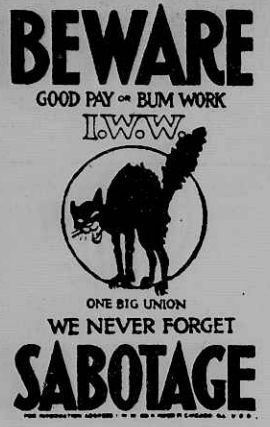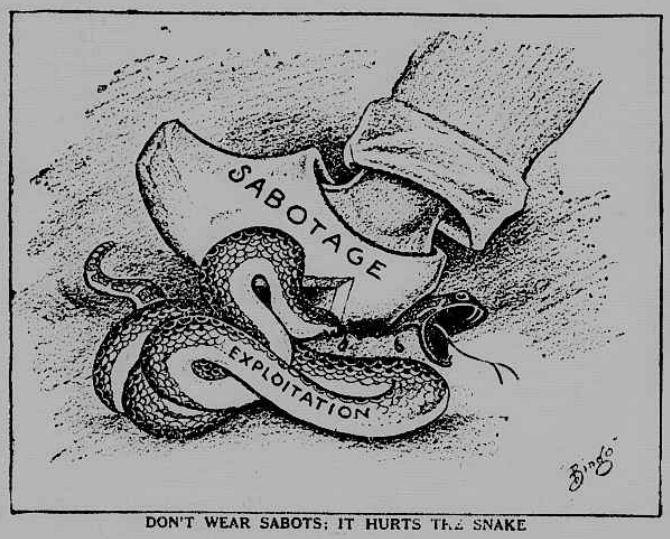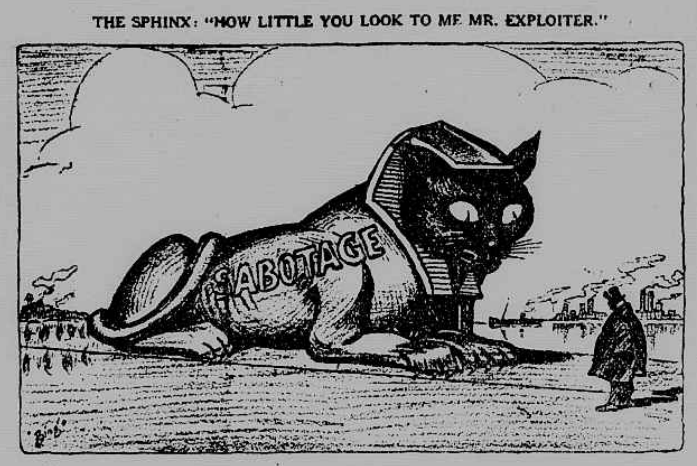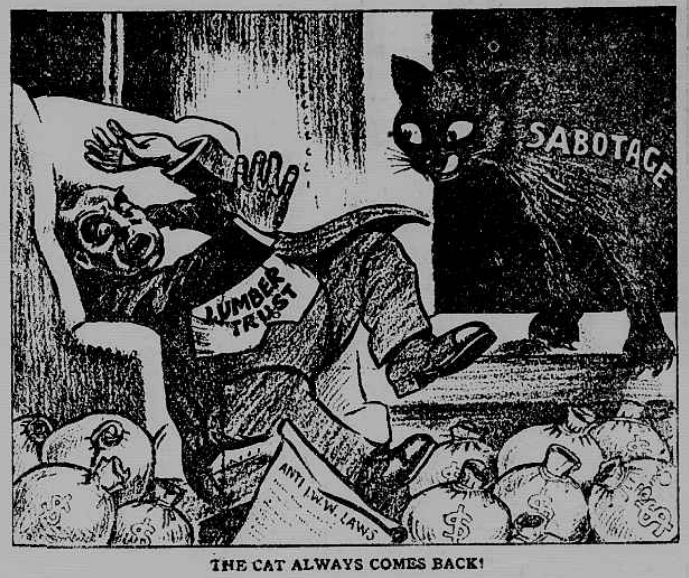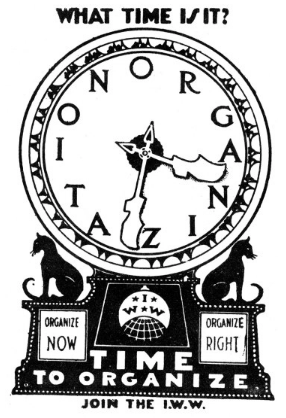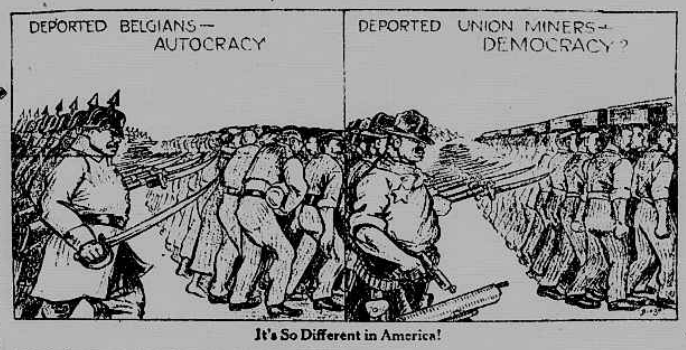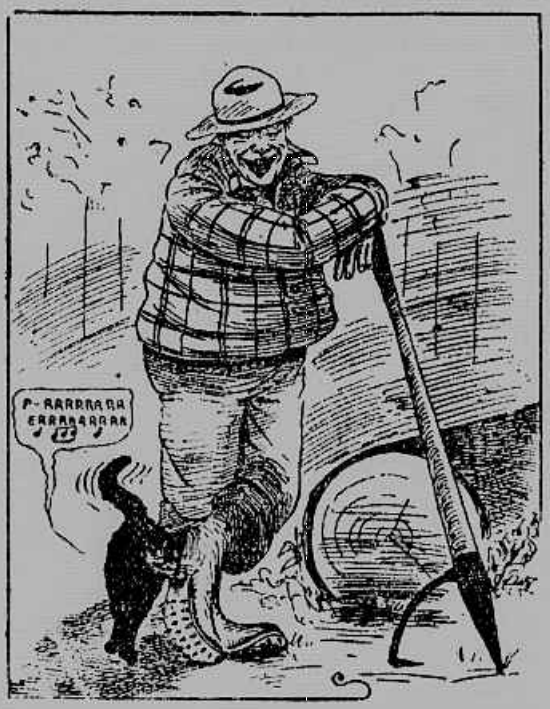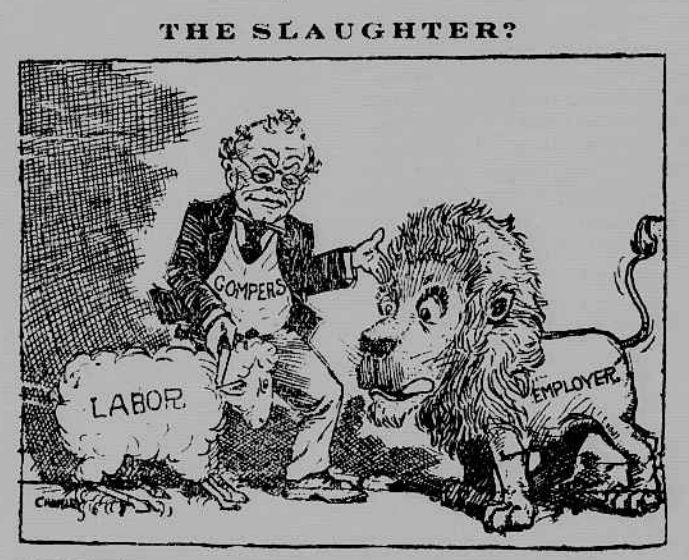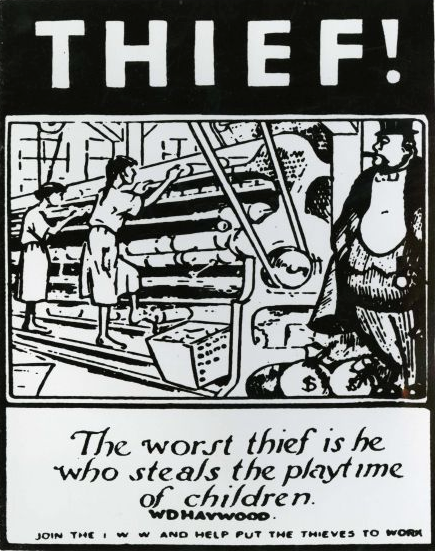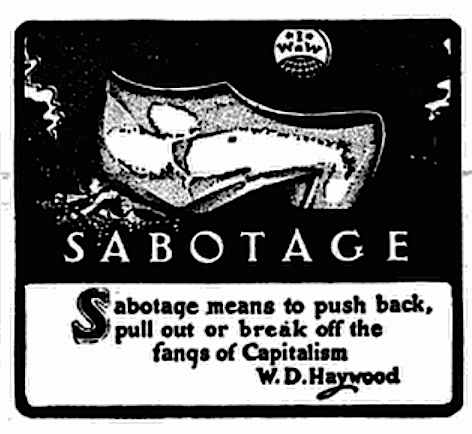The worst thief is he who steals
the playtime of children.
Join the I. W. W. and help put
the thieves to work.
-Big Bill Haywood
Hellraisers Journal, Tuesday April 16, 1918
As Chicago Trial Continues, IWW Found Guilty by Kept Press
Today we offer Part One of the following article by Boyden R. Sparkes which appeared as a full-page spread in the April 14th edition of the New York Tribune. We will conclude tomorrow with Part Two.
THE I. W. W.: AN X-RAY PICTURE
Chicago Trial Shows Searing Sparks from the Anvil Where Industrial-Military Power is Being Forged Endanger Progress-
Sabotage, Malcontents’ Principal Weapon,
a Menace to Farm, Factory and Home.THE I. W. W. PRINCIPLES AS SHOWN IN THEIR OWN CARTOONS
By Boyden R. Sparkes
Chicago, April 13, 1918.
OUT in the hill country of Oklahoma last August a group of tenant farmers and oil field workers were just a little too quick on the trigger, and what Federal officials believe was intended to have been a country-wide uprising of American “Bolsheviki” against the draft law was quelled almost before it started.
At the hearing in the Federal court in Enid, Okla., it was developed that forty-eight organizations under the leadership of the Industrial Workers of the World had planned a nation-wide revolution. The anti-draft rioters in Seminole, Hughes and Pontotoc counties began shooting just a little too soon, and posses of patriotic citizens had put 500 of them under arrest before many persons had been killed.
The men arrested belonged to organizations affiliated with the I. W. W., chief among these being the “Working Class Union.” The government is still trying to find out where the money used to purchase arms for the rioters came from.
It is the opinion of government attorneys that these I. W. W. leaders believed they would receive the support of the American Federation of Labor. Naturally any such hope was doomed to disappointment. But the government is still picking up threads of evidence that strengthen the belief that the American Bolsheviki leaders were prepared and hoping for a reign of terror in America that would have far outdone the Bolsheviki uprising in Russia.
The government is now holding 114 of these leaders for trial here on indictments for seditious conspiracy. For days Judge Kenesaw M. Landis, the man who once assessed a $29,000,000 fine against the Standard Oil Company, has been trying to secure a jury for the trial. The attempt failed and the government is going to start again Monday.
The first attempt failed because Socialist sympathizers of the “class war prisoners” tried to investigate the character and beliefs of the members of the venire from which a jury was to have been selected, and through “misguided zeal” (perhaps) went so far as to talk to the men themselves. When Judge Landis heard of this last Saturday he dismissed the venire promptly and the prisoners-those who have failed to secure the very high bail that has been fixed in their cases-went back to what they call “starvation hole”-the Cook County jail-for a week of misery, unrelieved by the sixty-cent government meals that are provided, along with individual cuspidors when they go to the Federal Building to attend sessions of their trial.
—–
West Knows the American Bolsheviki
The menace of the I. W. W. has hardly been felt yet in the East. But the West has felt the hand of the “American Bolsheviki” to its sorrow. From Maine to Canada, from the lumber camps and mines of northern Michigan to the orchards of California, this organization has made bitter trouble. It has delayed the nation’s preparations for war and has crippled housekeeping; it has crippled farms and stopped railroads; it has not stopped at the use of torch, gun and dynamite. Western farmers are going “heeled” to meet the danger, Western sheriffs have strengthened their posses and the government at Washington has sent reinforcements-both legal and physical-into the fight.Even the men who are leading this fight do not claim to have measured the menace. It is underground, creeping stealthily among the men and women with whom society as a whole has little contact. It breaks out without warning in unexpected places. It strikes mysteriously when no hand is seen.
Why? What is the motive behind these men? What is driving them to risk liberty and life? What has forced them to go outside the means this nation has provided for itself to right its wrongs and what has driven them to the use of weapons which have been despised by all mankind as base and cowardly?
The gathering of the leaders here for trial has given an opportunity such as has never before been presented to see the I. W. W. as a whole to get an X-ray picture of its mind, its ideals and its methods.
Watch them as they file into court, or go among them in the jail corridors. Most of them are cheerful, likable souls. Some would make delightful companions on a hunting expedition. “Red” Doran, the bearded Socrates of the organization, always looks as though he had been scrubbed not more than five minutes ago. Almost all the important men among them are positively fastidious. But side by side with these are a crowd who look as if they had not been bathed in years, dirty to the point of filth, ragged, unkempt and revolting.
The Ends of the Earth They Come From
Their nationalities are those of the melting pot: Italian, Mexican, Russian, German, Irish-and not a few of American birth and parentage. Their types are as diverse-ranging from the overbred intellectual to the almost primeval brute.
Among those who travel in handcuffed pairs each day of the trial between the county jail and the Federal building through the curious cosmopolitan throngs of Clark street is Charles Ashleigh. He grins when he tells you that he used to do publicity work for Anne Morgan in New York. Ashleigh is thirty years old and has been a reporter for radical newspapers most of his life. He was born in England, and since he was fifteen years old has been trying to rescue the working class from everything-from the tyranny of the “landed gentry” to the wage slavery of the “industrial kaisers” of America. His stamping ground in New York is Greenwich Village. Yes, he wears a flowing, black necktie.
But through all this amazing fellowship runs a common factor. Their faces light to the same phrases, they share the same privations and dangers according to their several natures-under the shadow of the court itself they all are instant in th preaching of their doctrine. They bear the unmistakable marks of the zealot, of him who has given his life to a cause and believes in that cause with his very soul.
—–
They Speak Highly Of Their Cause
That cause, as is plain from the words and works of every man, is discontent with life as they have found or made it, and desire for liberty and equality as they view them.
These men are not interested politics, however. It is economic equality and freedom that they want-equal distribution of all wealth, equal sharing of all work, equal living conditions for all men and women, strong or weak, good or bad wise or foolish, lazy or industrious. He denies all distinctions-or if he admits them it is to shift the blame for them from the bad or lazy individual to the state of society that produced him, and to declare that when the new order comes all men will be equally useful to all others.
The basis of his foredreamed new order is to be the unskilled men and women. They, he declares, are the lowest of the wage-slaves, the most abused and exploited, and they shall rule by right of numbers. His class warfare is directed almost as bitterly against the skilled workman as against the capitalist-and the capitalist to his mind includes the widow who owns a small house and the struggling worker who has managed to save a few dollars in a bank. All these must be made as he-the I. W. W.-is today.
There is no room for patriotism in this creed. The fellow countryman of the I. W. W., as of the Bolsheviki, is any unskilled worker anywhere on earth. Their frontier is the line of ownership of any property. Their enemies are all above that line. They see in the great war merely a weakening of the powers of the government that gives them a better chance to push their revolution. They will take help wherever they can get it-and there are strong suspicions that their funds to-day are coming from the Germans. The “wobbly” cannot see that if he turns the country upside down at this moment the Kaiser will wall across Europe and eventually into the United States and put the things the “wobbly” wants a thousand years into the future. If the Kaiser comes he will be fought as the present authorities are being fought—meanwhile the I. W. W. turns to the work at hand.
SOURCE & IMAGES
New York Tribune
(New York, New York)
-Apr 14, 1918, page 6 of part III
Part III- Editorials, Special Articles, Automobiles
https://chroniclingamerica.loc.gov/lccn/sn83030214/1918-04-14/ed-1/seq-28/
See also:
Note: Boyden R Sparkes also covered the Battle of Blair Mt-see Fourth Estate of Sept 10, 1921 which tells the story of how he was wounded by WV state troopers (+ short bio of Sparkes), and also tells story of woman reporter who suffered a hand wound and certain “indignities” at hands of state troopers:
https://play.google.com/books/reader?id=9DZJAQAAMAAJ&printsec=frontcover&output=reader&hl=en&pg=GBS.RA10-PA2
Hellraisers Journal, Saturday August 25, 1917
Southeastern Oklahoma – Tenant Farmers Rebellion Crushed
Oklahoma Tenant Farmers Rebellion About More Than Draft Resistance, So Says Northwest Worker
We Will Sing One Song – Six Feet In the Pine
Lyrics by Joe Hill
Joe Hill had knack for summing-up great and grand ideas in a few simple verses. This is what the IWW stood for in Joe Hill’s day and still yet stands-for today:
We will sing one song of the meek and humble slave,
The horn-handed son of the soil,
He’s toiling hard from the cradle to the grave,
But his master reaps the profits from his toil.
Then we’ll sing one song of the greedy master class,
They’re vagrants in broadcloth, indeed,
They live by robbing the ever-toiling mass,
Human blood they spill to satisfy their greed.
CHORUS:
Organize! Oh, toilers, come organize your might;
Then we’ll sing one song of the workers’ commonwealth,
Full of beauty, full of love and health.
We will sing one song of the politician sly,
He’s talking of changing the laws;
Election day all the drinks and smokes he’ll buy,
While he’s living from the sweat of your brow.
Then we’ll sing one song of the girl below the line,
She’s scorned and despised everywhere,
While in their mansions the “keepers” wine and dine
From the profits that immoral traffic bear.
We will sing one song of the preacher, fat and sleek,
He tells you of homes in the sky.
He says, “Be generous, be lowly, and be meek,
If you don’t you’ll sure get roasted when you die.”
Then we sing one song of the poor and ragged tramp,
He carries his home on his back;
Too old to work, he’s not wanted ’round the camp,
So he wanders without aim along the track.
We will sing one song of the children in the mills,
They’re taken from playgrounds and schools,
In tender years made to go the pace that kills,
In the sweatshops, ‘mong the looms and the spools.
Then we’ll sing one song of the One Big Union Grand,
The hope of the toiler and slave,
It’s coming fast; it is sweeping sea and land,
To the terror of the grafter and the knave.

